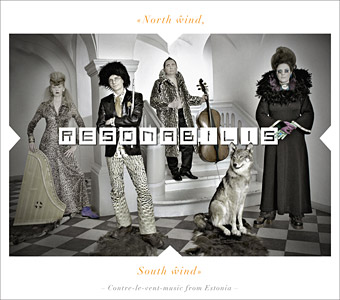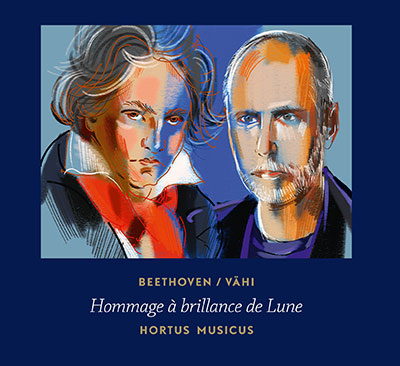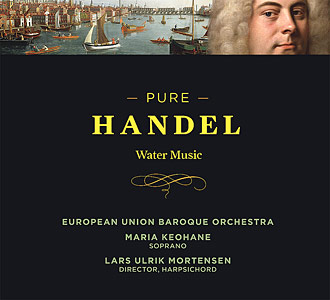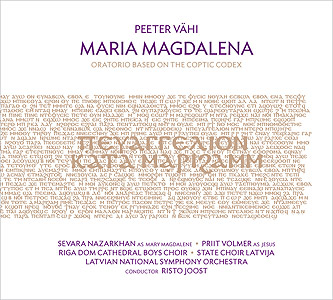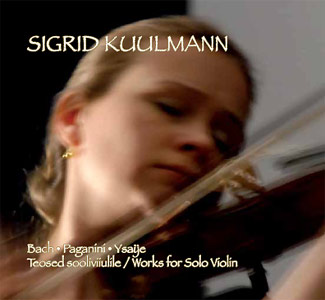
Nonstop
November 10, 2020
Eduard Tubin. Works for Violin and Piano. Vol 1
November 10, 2020Arvo Pärt. Pilgrim’s Song
€13.85
PILGRIM’S SONG
Arvo Pärt
Voces Musicales
Tallinn Sinfonietta
Risto Joost, dirigent
CD
2009
ERP 2309
In stock
Award: Record of the Year 2009! (Choral Music category, Estonia). Two works show the choir at its peak… their Summa, available in more versions than you can shake a baton at, is on of the best. Performance 5/5, Recording 5/5 (Barry Witherden, BBC Music Magazine, 2010, the UK)
| 1 | Pilgrim’s Song | 10:12 |
| 2 | Magnificat | 6:33 |
| 3 | Summa | 4:36 |
| 4 | Nunc dimittis | 7:33 |
| 5 | Te Deum | 29:50 |
Performed by: chamber choir Voces Musicales and Tallinn Sinfonietta, conductor Risto Joost
Sound engineer: Maido Maadik
Assistant engineers: Priit Karind and Rein Palo
Liner notes: Jorma Sarv, Maria Mölder
Translations: Pirjo Püvi, Gerhard Lock
Photos: Mait Jüriado, Peeter Vähi
Booklet compiled by Riin Eensalu
Design: Mart Kivisild
Producer: Peeter Vähi
Recorded in Tallinn St Nicolaus church in 2009 by Estonian Public Broadcasting
Manufactured by Baltic Disc
Scores published by Universal Edition
ERP 2309
![]() Arvo Pärt. Pilgrim’s Song, fragm, 4 min 3 sec, mp3
Arvo Pärt. Pilgrim’s Song, fragm, 4 min 3 sec, mp3
![]() Arvo Pärt. Te Deum, fragm, 3 min 42 sec, mp3
Arvo Pärt. Te Deum, fragm, 3 min 42 sec, mp3
 Chamber choir Voces Musicales was founded in 1999 by Risto Joost mainly from the students of the Estonian Academy of Music. Audiences received the choir well already during the first season, which was highlighted by prizes from several competitions. In April 2001, as a great acknowledgment Voces Musicales won 1st prize in the category of chamber choirs at the international choir competition Tallinn 2001. Success in the Tallinn choir competition was continued by another victory in 2005, when besides two 2nd prizes in minor categories the choir also won the Grand Prix.
Chamber choir Voces Musicales was founded in 1999 by Risto Joost mainly from the students of the Estonian Academy of Music. Audiences received the choir well already during the first season, which was highlighted by prizes from several competitions. In April 2001, as a great acknowledgment Voces Musicales won 1st prize in the category of chamber choirs at the international choir competition Tallinn 2001. Success in the Tallinn choir competition was continued by another victory in 2005, when besides two 2nd prizes in minor categories the choir also won the Grand Prix.
The repertoire of the choir includes music from Renaissance polyphonies to contemporary compositions. Voces Musicales has been a guest performer at festivals in France, Israel and Finland and has participated in the performance of several oratorical works. The choir has premièred the compositions of several composers (Toivo Tulev, Helena Tulve, Timo Steiner, Ülo Krigul, etc). Voces Musicales has co-operated with conductors Neeme Järvi, Olari Elts, Arvo Volmer, Andres Mustonen, Jüri Alperten and orchestras such as the Estonian National Symphony Orchestra, Tallinn Chamber Orchestra, Corelli Baroque Orchestra, NYYD Ensemble, Hortus Musicus, Pärnu City Orchestra. In autumn 2009, the choir celebrated their 10th anniversary with a jubilee concert.
 Conductor Risto Joost (b 1980) studied singing as well as choral and orchestral conducting at the Estonian Academy of Music, and received further training at the University for Music and Performing Arts in Vienna. He has participated in the conducting master classes of Neeme Järvi, Esa-Pekka Salonen, Eri Klas, Paul Mägi, Paul Hillier and several early music master classes in Denmark and Sweden.
Conductor Risto Joost (b 1980) studied singing as well as choral and orchestral conducting at the Estonian Academy of Music, and received further training at the University for Music and Performing Arts in Vienna. He has participated in the conducting master classes of Neeme Järvi, Esa-Pekka Salonen, Eri Klas, Paul Mägi, Paul Hillier and several early music master classes in Denmark and Sweden.
In 1999 Risto Joost founded the chamber choir Voces Musicales. Since 2000, Risto Joost has regularly participated in the Estonian Music Days and NYYD Festival, conducting approximately 50 première performances ranging from chamber music to symphonic repertoire. From 2001–2002, he was a singer in the Estonian Philharmonic Chamber Choir. In 2002, he founded his own orchestra, Ensemble Voces Musicales, which is focused on performing Baroque and contemporary music.
In spring 2008 Risto Joost graduated from the Royal College of Music in Stockholm majoring in orchestral conducting with Prof Jorma Panula. He has conducted the Estonian National Symphony Orchestra, Pärnu City Orchestra, Tallinn Chamber Orchestra, Tallinn Baroque Orchestra, Corelli Baroque Orchestra, Latvian National Symphony Orchestra, Ostrobothnian Chamber Orchestra, Swedish Chamber Orchestra, Gävle Symphony Orchestra, Helsingborg Symphony Orchestra as well as the Estonian Philharmonic Chamber Choir, Estonian National Male Choir RAM, Swedish Radio Choir, State Choir Latvija, Ars Nova Copenhagen.
Since autumn 2006 Risto Joost is the principal conductor of the Tallinn Music High School Symphony Orchestra. In June 2007 he made his debut in the Estonian National Opera conducting Erkki-Sven Tüür’s opera Wallenberg and in spring 2008 he conducted Mozart’s La Finta Giardiniera in co-operation with the opera studio of the Estonian Academy of Music. Since Sep 2009, Risto Joost is a conductor at the Estonian National Opera. From 2010–2011 the artistic adviser to Glasperlenspiel Festival.
Tallinn Sinfonietta was established with the aim of performing symphonic repertoire written primarily in the 18th and 19th centuries and focusing on music from the classical and romantic periods. The orchestra’s debut concert was titled Mozart and his symphonies; with this concert series the orchestra strives to perform all the symphonies of W A Mozart.
Tallinn Sinfonietta consists of young professional musicians who pursue active careers as soloists and chamber musicians, performing in Estonia as well as abroad.
Arvo Pärt was born in Estonia on Sep 11th, 1935. His musical studies began in 1954 at the Tallinn Music Secondary School, interrupted less than a year later while he fulfilled his National Service obligation as oboist and drummer in an army band. He returned to school for a year before joining the Estonian Academy of Music in 1957, where his composition teacher was Prof Heino Eller. Pärt started work as a recording engineer with Estonian Radio, wrote music for the stage and received numerous commissions for film scores so that, by the time he graduated from the Academy of Music in 1963, he could already be considered a professional composer. He won 1st prize in the All-Union Young Composers’ Competition for the children’s cantata Our Garden and the oratorio Stride of the World.
 Living in the USSR, Pärt had little access to what was happening in contemporary Western music but, despite such isolation, the early 60s in Estonia saw many new methods of composition being brought into use and Pärt was at the fore front. His Nekrolog was the first Estonian composition to employ serial technique. He continued with serialism through to the mid 60s in the Symphony No 1, Symphony No 2 and Perpetuum Mobile, but ultimately tired of its rigours and moved on to experiment, in works such as Collage über BACH, with collage techniques.
Living in the USSR, Pärt had little access to what was happening in contemporary Western music but, despite such isolation, the early 60s in Estonia saw many new methods of composition being brought into use and Pärt was at the fore front. His Nekrolog was the first Estonian composition to employ serial technique. He continued with serialism through to the mid 60s in the Symphony No 1, Symphony No 2 and Perpetuum Mobile, but ultimately tired of its rigours and moved on to experiment, in works such as Collage über BACH, with collage techniques.
Official judgement of Pärt’s music veered between extremes, with certain works being praised and others, like the Credo of 1968, being banned. This would prove to be the last of his collage pieces and after its composition, Pärt chose to enter the first of several periods of contemplative silence, also using the time to study French and Franco-Flemish choral music from the 14th to 16th centuries: Machaut, Ockeghem, Obrecht, Josquin. At the beginning of the 70s, he wrote a few transitional compositions in the spirit of early European polyphony, like his Symphony No 3.
Pärt turned again to self-imposed silence, but re-emerged in 1976 after a transformation so radical as to make his previous music almost unrecognizable as that of the same composer. The technique he invented, or discovered, and to which he has remained loyal, practically without exception, he calls tintinnabuli (‘little bells’), which he describes thus: “I have discovered that it is enough when a single note is beautifully played. This one note, or a silent beat, or a moment of silence, comforts me. I work with very few elements – with one voice, two voices. I build with primitive materials – with the triad, with one specific tonality. The three notes of a triad are like bells and that is why I call it tintinnabulation.” The basic guiding principle behind tintinnabulation of composing two simultaneous voices as one line – one voice moving stepwise from and to a central pitch, first up then down, and the other sounding the notes of the triad – made its first public appearance in the short piano piece Für Alina.
Having found his voice, there was a subsequent rush of new works and three of the 1977 pieces – Fratres, Cantus in Memoriam Benjamin Britten, and Tabula Rasa – are still amongst his most highly regarded. As Pärt’s music began to be performed in the west and he continued to struggle against Soviet officialdom, his frustration ultimately forced him, his wife Nora and their two sons, to emigrate in 1980. They never made it to their intended destination of Israel but, with the assistance of his publisher in the West, settled firstly in Vienna. One year later he moved to Berlin.
Pärt has concentrated on setting religious texts, which have proved popular with choirs and ensembles around the world. Among his champions in the West have been ECM Records who released the first recordings of Pärt’s music outside the Soviet bloc, Hilliard Ensemble who have premièred several of the vocal works, and Neeme Järvi who conducted the première of Credo in Tallinn in 1968, and has, as well as recording the tintinnabuli pieces, introduced Pärt’s earlier compositions through performances and recordings.
Pärt’s achievements were honoured in his 61st year by his election to the American Academy of Arts and Letters. In May 2003, he also received the Contemporary Music Award at the Royal Albert Hall in London, and in May 2011, again in Royal Albert Hall won the Classic BRIT Award Composer of the Year 2011.


